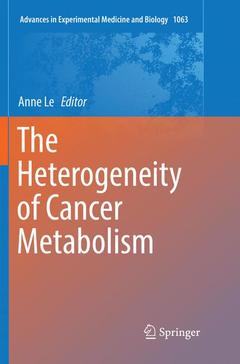Description
The Heterogeneity of Cancer Metabolism, Softcover reprint of the original 1st ed. 2018
Advances in Experimental Medicine and Biology Series, Vol. 1063
Coordinator: Le Anne
Language: English
Subjects for The Heterogeneity of Cancer Metabolism:
Support: Print on demand
Description
/li>Contents
/li>Biography
/li>Comment
/li>
Genetic alterations in cancer, in addition to being the fundamental drivers of tumorigenesis, can give rise to a variety of metabolic adaptations that allow cancer cells to survive and proliferate in diverse tumor microenvironments. This metabolic flexibility is different from normal cellular metabolic processes and leads to heterogeneity in cancer metabolism within the same cancer type or even within the same tumor.
In this book, we delve into the complexity and diversity of cancer metabolism, and highlight how understanding the heterogeneity of cancer metabolism is fundamental to the development of effective metabolism-based therapeutic strategies. Deciphering how cancer cells utilize various nutrient resources will enable clinicians and researchers to pair specific chemotherapeutic agents with patients who are most likely to respond with positive outcomes, allowing for more cost-effective and personalized cancer therapeutic strategies.
Part 1: The metabolism of cancer cells.- Chapter 1: Glucose Metabolism.- Chapter 2: Glutamine Metabolism.- Chapter 3: Amino Acid Metabolism.- Chapter 4: Lipid Metabolism.- Chapter 5: Epigenetics and oncometabolites.- Part 2: Heterogeneity of Cancer Metabolism - Chapter 1: Specific oncogenetic mutations lead to specific metabolic phenotypes within the same tissue of origin.- Chapter 2: Intratumoral heterogeneity of cancer cell metabolism .- - Chapter 3: Differential metabolism in vitro and in vivo.- Part 3: Carcinoma associated fibroblasts.- Chapter 1: Characteristics of CAF's.- Chapter 2: Reverse Warbug EFF.- Chapter 3: Metabolic exchange between CAFs and cancer cells.
Anne Le studied at the Paris Descartes University, Cochin Port-Royal School of Medicine, in France where she obtained a Habilitation degree (https://en.wikipedia.org/wiki/Habilitation), the highest academic qualification a scholar can achieve in Europe. After her clinical training at Henri Poincaré University Hospital, Nancy, in France, she started her postdoctoral research fellowship at the Johns Hopkins University School of Medicine in 2007. Since 2011, Dr. Le has been an independent investigator who has yielded a number of contributions to the field of cancer metabolism, demonstrated by her publication record as a pioneer in the field. She has published in the best journals, such as Cell Metabolism and the Proceedings of theNational Academy of Sciences of the United States of America. Dr. Le has been invited to present her work at several annual American Association for Cancer Research meetings, the most prestigious international meeting for cancerresearch scientists and professionals, as well as by the National Cancer Institute, and universities in France, Monaco, Japan, and Taiwan. Research media, such as Science Daily, American Association for the Advancement of Science (AAAS), Business Insider, ALN® Magazine, among many others, have written about her work. Dr. Le is highly respected and sought after for her strong proficiency in judging the work and ideas of her peers. She is regularly invited to serve on review panels by prestigious organizations such as the National Institutes of Health and the US Department of Defense. She is frequently asked by high-cited scientific journals to review manuscripts submitted to their journals.




